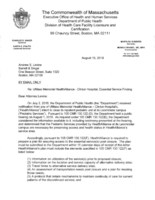LEOMINSTER, Mass., Aug. 23, 2018 /PRNewswire/ -- The state's Department of Public Health (DPH) notified UMass Memorial HealthAlliance – Clinton Hospital via letter this week that the pediatric services it provides at its Leominster campus are, in fact, necessary for preserving access and health status in HealthAlliance's service area."
"The DPH is in agreement with the people of northern Worcester County and has found that these pediatric services are essential and should be maintained," said Natalie M. Pereira, an RN at Leominster Hospital and a member of the coalition that formed around saving the pediatric unit at the Leominster campus. "As far as we are concerned, the only solution is to maintain these services as they are, where they are, for the good of the public. Now we will wait to see if UMass and HealthAlliance executives will actually do the right thing."
"It is disappointing that the cardiac rehab at Leominster and the urgent-care center at Burbank were not deemed 'essential'," said Cheryl Bouchard, an RN at Burbank Hospital and also a coalition member, "although we appreciate that the DPH heard the concerns of affected patients and that it added language to its HealthAlliance letter that addresses these issues. We now hope UMass will reevaluate its decision to cut these service and instead continue to provide urgent care in Fitchburg that doesn't require you to pay for services at the front door."
In accordance with the letter, the hospital now has 15 days to provide DPH with its plan to maintain access to this vitally important service. If it proceeds with a closure — which it is allowed to do under state law — the hospital must provide information to the DPH on how alternative sites/programs/resources will meet the needs of the community. Examples of the information the hospital will need to provide in order to prove that comparable resources are in fact available include:
- Location of and capacity at alternative sites
- Travel times to alternative sites
- Transportation alternatives for patients
- Protocols that detail how to maintain continuity of care for patients
- Details on meeting patient's cultural and linguistic needs
- A communication plan for both the local community and staff that will inform them of any changes and how they stand to be affected
- A complete list of DPH's requests of HealthAlliance are available here
"Unfortunately, the UMass system — and HealthAlliance in particular — have become expert at putting profits before patients," said Pereira. "Their most recent decisions and cuts will leave our most vulnerable patients out in the cold. Sick children will now need to travel unnecessarily for care that should be local. Elderly patients who need cardiac rehab services will also need to travel too far for care. Economically marginalized patients, many of whom do not even have a credit card, will be forced to visit clinics where payment is required up front. And our local emergency departments will be where all of these now disenfranchised patients go for care instead. It is recipe for disaster for everyone."
HealthAlliance and its parent organization, UMass Memorial Health Care have spent much of the last several months attempting to cut services that it claims are either unprofitable or unnecessary. Beyond the pediatric unit, the urgent care center, and the cardiac rehab center, these services include the Plumley Village Health Center in Worcester; the endoscopy and other ambulatory services at UMass HealthAlliance – Clinton Hospital; and 13 psychiatric beds at UMass Memorial Medical Centers' (UMMMC) University Campus. In almost all instances, the patients who most often utilize(d) these services are patients who have the most difficulty in advocating for themselves: the elderly, children, English-as-a-second-language speakers, and those struggling economically.
HealthAlliance's final decisions on its proposed closures will be telling, especially given that this week's DPH letter about the pediatric unit was issued just days after both The Boston Globe and The Boston Business Journal reported that hospital execs in Mass. take in unimaginable salaries, are given outrageous salary increases, and receive bonuses and benefits that are off the charts.
"It should be noted that HealthAlliance CEO Deb Weymouth, as well as two of her UMass colleagues, top this list," added Cheryl Bouchard. "And it should also be noted that they ended up topping this list of 'most highly compensated hospital executives' at the same time they are attempting to, or have already, cut essential health care services for our most vulnerable patients."
According to both news stories, Deb Weymouth, president and CEO of HealthAlliance Hospitals, received $555,662 in compensation in 2015 and $622,696 in 2016, equaling a 12 percent increase. Dr. Eric Dickson, president and CEO of UMass Memorial Health Care, received $1.83 million in compensation in 2015 and $2.01 million in 2016, equaling a 10 percent increase. Patrick Muldoon, former president of UMass Memorial Medical Center (UMMC), received $1.28 million in compensation in 2015 and $1.46 million in 2016, equaling a 14 percent increase.
____________________________________________
Founded in 1903, the Massachusetts Nurses Association is the largest union of registered nurses in the Commonwealth of Massachusetts. Its 23,000 members advance the nursing profession by fostering high standards of nursing practice, promoting the economic and general welfare of nurses in the workplace, projecting a positive and realistic view of nursing, and by lobbying the Legislature and regulatory agencies on health care issues affecting nurses and the public.
SOURCE Massachusetts Nurses Association
Related Links
WANT YOUR COMPANY'S NEWS FEATURED ON PRNEWSWIRE.COM?
Newsrooms &
Influencers
Digital Media
Outlets
Journalists
Opted In






Share this article